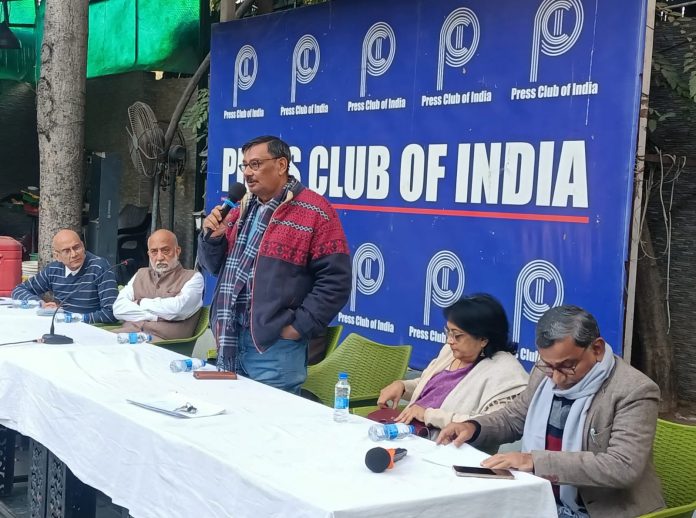New Delhi: On the eve of Human Rights Day, the Press Club of India (PCI) and Janhastakshep jointly organised a programme urging all democratic segments of Indian society, particularly the middle-class intelligentsia, to stand in solidarity with the rights of the marginalised and the cause of press freedom. The event emphasised the defence of journalists, social activists, and human rights defenders.
Gautam Lahiri, President of PCI, highlighted critical challenges facing the media in India. “The media today is at the receiving end of severe human rights violations. A thriving democracy requires a free and independent press, but in our country, the press has been systematically muzzled, voices suppressed, and dissenting journalists jailed. Many journalists are currently behind bars, and state power is being wielded heavily against those who dare to speak out,” he said.
Lahiri also expressed concern about India’s low ranking on the Media Freedom Index, which lags behind even some neighbouring countries lacking democratic governance. He criticised the Human Rights Commissions in India for being subservient to the ruling government.
“In these difficult times, when dissent and protest are increasingly stifled, the Press Club has opened its doors to farmers, Dalits, minorities, media professionals, and other marginalised sections of society,” he added.
Senior Supreme Court lawyer Colin Gonsalves painted a grim picture of the human rights situation. “Dark clouds loom over us, and the situation is more dangerous than we can imagine. The Prime Minister may face challenges, but the human rights movement is heading toward perilous times. The judiciary has seen members aligned with the RSS and BJP before, but the open and shocking statements being made today, such as those by an Allahabad High Court judge, reflect an alarming normalisation of such rhetoric.”
Another senior advocate, Sanjay Parikh, strongly condemned the controversial statement by the Allahabad High Court judge. He called for strict action against the judge and a review of all his previous judgments and orders.
M.K. Venu, founding editor of The Wire, noted the government’s increasing control over mainstream media over the past decade. However, he pointed out the government’s concern about the rise of independent online media. Quoting MP Mahua Moitra, Venu said, “The democratisation of media and the role of smaller outlets before the Lok Sabha elections had a significant impact on the election outcome. The government is now targeting smaller media platforms and online outlets to curb their influence.”
He also spoke about the nexus between big corporates like Adani and Reliance and the government, warning of its impact on media content.
The event concluded with adoption of a resolution that demands: Immediate bail for all political prisoners and student activists who have been unjustly incarcerated for years without trial; an end to the recent wave of communal attacks on the Muslim minority, including assaults on their places of worship, with strict enforcement of The Places of Worship (Special Provisions) Act, 1991; and the removal of Manipur’s Chief Minister, Biren Singh, for his failure to address the ongoing crisis in the state.




